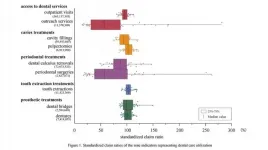COVID-19 can cause severe inflammation in the brain
2021-06-14
(Press-News.org) Both during and after infection with the Coronavirus SARS-CoV-2, patients may suffer from severe neurological symptoms, including "anosmia", the loss of taste and smell typically associated with COVID-19. Along with direct damage caused by the virus, researchers suspect a role for excessive inflammatory responses in the disease. A team of researchers from the Freiburg University Medical Center and the Cluster of Excellence CIBSS has now shown that a severe inflammatory response can develop in the central nervous system of COVID-19 patients involving different immune cells around the vascular system and in the brain tissue. The team led by Professor Dr. Marco Prinz, Medical Director at the Institute of Neuropathology, and Professor Dr. Dr. Bertram Bengsch, Section Head of Translational Systems Immunology in Hepatogastroenterology at the Internal Medicine II just published their results in the current issue of Immunity.
"Even though there was already evidence of central nervous system involvement in COVID-19, the extent of inflammation in the brain surprised us," says lead author Henrike Salié. "In particular the many microglial nodules we detected cannot usually be found in the healthy brain," comments lead author Dr. Marius Schwabenland. Using a novel measurement method, imaging mass cytometry, they were able to determine different cell types as well as virus-infected cells and their spatial interaction in previously unseen detail.
Disruption of the brain's immune response
"Until now, the inflammatory pattern in COVID-19 was poorly understood. Even compared to other inflammatory brain diseases, the inflammatory responses triggered by COVID-19 are unique and indicate a severe disturbance of the brain's immune response. In particular, the essential defense cells of the brain, known as microglial cells, are particularly strongly activated, and we also observed migration of T-killer cells and development of a pronounced neuroinflammation in the brain stem," says Prinz, who received the Leibniz Prize in 2020 for his research.
"The immune changes are particularly detectable near small brain vessels. In these areas, the viral receptor ACE2 is expressed, onto which the coronavirus can dock, and the virus was also directly detectable there," Bengsch adds, "It seems plausible that the immune cells recognize infected cells there and that inflammation then spreads to the nerve tissue, causing symptoms It is possible that early immunomodulatory or immunosuppressive treatment could reduce inflammation."
Immunological, virological, and neuropathological research
Professor Dr. Robert Thimme, Medical Director of Internal Medicine II at the Freiburg Medical Center and Vice Dean for Academic Affairs of the University of Freiburg Medical Faculty, emphasizes how high levels of scientific expertise and excellent cooperation between different research teams is a basic prerequisite for rapid knowledge gain in the pandemic. "Patient-oriented immunological, virological, and neuropathological research using state-of-the-art methods is a core strength at the Freiburg Medical Center. This study shows how we can contribute to understanding the disease processes in the Coronavirus pandemic through excellent research in Freiburg. While we already knew that a strong immune response is needed for recovery from Coronavirus infection, apparently a misdirected immune response can cause severe damage."
INFORMATION:
The study was made possible by Germany-wide collaborations with groups, including Professor Dr. Markus Glatzel from the Institute of Neuropathology at the University Medical Center Hamburg-Eppendorf (UKE), as well as researchers from the University Medical Center Göttingen and the University of Heidelberg.
Sponsors of this research included the state of Baden-Württemberg, three Collaborative Research Centers (SFB992, SFB1160, TRR179), and the German Research Foundation's Heisenberg Program, as well as the Cluster of Excellence CIBSS Centre for Integrative Biological Signalling Studies at the University of Freiburg.
Publication:
Schwabenland, M., Salié, H. et al., Thimme, R., Glatzel, M., Prinz, M., Bengsch, B. (2021): Deep spatial profiling of human COVID-19 brains reveals neuroinflammation with distinct microanatomical microglia-T cell interactions. In: Immunity. DOI: 10.1016/j.immuni.2021.06.002
Contact:
Prof. Dr. Dr. Bertram Bengsch
Internal Medicine II
Freiburg Medical Center
Phone: 0761/270-32870
E-Mail: bertram.bengsch@uniklinik-freiburg.de
Professor Dr. Marco Prinz
Institute of Neuropathology
Freiburg Medical Center
Phone: 0761/270-51060
E-Mail: marco.prinz@uniklinik-freiburg.de
ELSE PRESS RELEASES FROM THIS DATE:
2021-06-14
Dr Sebastian Hess and his team at the University of Cologne's Institute of Zoology have studied a very rare and puzzling tripartite symbiosis. This consortium consists of a ciliate as host and two types of endosymbionts: a green alga and a previously unknown purple bacterium. Through genetic analyses of the pink-green ciliate, the researchers discovered that the endosymbiotic bacterium belongs to the so-called 'purple sulfur bacteria' (family Chromatiaceae), but has lost the ability to oxidize reduced sulfur compounds, a hallmark of the other members of the Chromatiaceae. The genome of the purple bacterium is greatly reduced, suggesting that the bacterium became mainly specialized in carbon fixation through photosynthesis. It is probably no longer able to live outside of the host cell. Thus, ...
2021-06-14
Boston - Hypertension, or high blood pressure, kills more Americans than any other health condition. It is especially prevalent in Black Americans and is exacerbated by structural barriers to accessing high quality healthcare. In a 2018 randomized trial called the Los Angeles Barbershop Blood Pressure Study (LABBS), barbers were trained to screen their Black male patrons for hypertension and refer them to a pharmacist who visited the barbershop to counsel and treat individuals with high blood pressure. Participants in the barbershop-based, pharmacist-led program saw a 20-point drop in systolic (top number) blood pressure that they were able to sustain ...
2021-06-14
An international research team led by Professor Dr Frank Schäbitz has published a climate reconstruction of the last 200,000 years for Ethiopia. This means that high-resolution data are now available for the period when early Homo sapiens, our ancestors, made their way from Africa to Europe and Asia. Schäbitz and his colleagues determined the dates using a drill core of lake sediments deposited in southern Ethiopia's Chew Bahir Basin, which lies near human fossil sites. Temporal resolution of the samples, reaching nearly 10 years, revealed that from 200,000 to 125,000 years before our ...
2021-06-14
Does evolution explain why we can't resist a salty chip? Researchers at NC State University found that differences between the elemental composition of foods and the elemental needs of animals can explain the development of pleasing tastes like salty, umami and sweet.
Taste tells us a lot about foods before they are swallowed and digested, and some tastes correspond with the elemental composition of foods. For example, an aged steak lights up the umami taste receptors, because it has a high concentration of the element nitrogen, which occurs in amino acid molecules. Nitrogen is essential for survival, but often occurs in low concentrations relative ...
2021-06-14
(Boston)-- The concept of rationing medical resources during the height of COVID-19 pandemic created tremendous anxiety in the patient and healthcare communities. In planning for that possibility Massachusetts created a triage scoring system focusing on an acute survival score that considers chronic life-limiting medical conditions of the patient, but it does not provide specifics about how to value those conditions in the equation.
Now a new study supports prioritizing resources to those who are most likely to survive an acute illness as several chronic medical conditions had less of an impact on longer-term survival than previously suspected.
"No one ...
2021-06-14
(Boston)--Despite evidence regarding the benefits of vaginal birth after cesarean and recommendations to support shared decision making to reduce cesarean rates, minority women face many impediments that limit their access to appropriate health information and opportunities for such discussions.
Haitian women in Massachusetts have the highest rates of cesarean section and low rates of vaginal birth after cesarean, despite evidence suggesting that many are eligible to attempt vaginal birth after a previous cesarean.
Now a new study explores how Haitian women's beliefs, values and attitudes influence their decision making about pregnancy and birth after having had a cesarean delivery. In conjunction with the providers' views about Haitian women, the information ...
2021-06-14
Farmed foxes selectively bred for tameness and aggressiveness exhibit similar changes to their brain anatomy, according to research recently published in JNeurosci. Both lineages also have larger brains than conventional farm-bred foxes, complicating leading theories on domestication.
Domesticated species provide insight into complex evolutionary processes on a condensed timeframe. When a species splits from its wild counterpart, its brain, body, and behavior undergo rapid changes. Studies with chickens, sheep, cats, dogs, and more indicate domestication shrinks the brain. But the same pattern does not extend to foxes in the expected way.
Hecht et al. used MRI to measure the brain size ...
2021-06-14
When Erin Hecht was earning her Ph.D. in neuroscience more than a decade ago, she watched a nature special on the Russian farm-fox experiment, one of the best-known studies on animal domestication.
The study, running since 1958, tries to replicate the natural domestication of wolves to dogs by selectively breeding two strains of silver foxes so they exhibit certain behaviors. Scientists breed one to be tame and display dog-like behaviors with people, such as licking and tail wagging. The other is bred to react with defensive aggression when faced with human contact, while a third strain acts as the control and isn't bred for any specific behaviors.
Hecht, who's now an assistant professor in the Harvard Department of Human ...
2021-06-14
Niigata, Japan - In the recent past, there has been a paradigm shift towards renewable sources of energy in order to address the concerns pertaining to environmental degradation and dwindling fossil fuels. A variety of alternative green energy sources such as solar, wind, hydrothermal, tidal etc., have been gaining attention to reduce the global carbon footprints. One of the key challenges with these energy generation technologies is that they are intermittent and are not continuously available.
"We cannot use solar energy at night and wind energy when the wind is not blowing. But we can store the generated electricity in some other forms and utilize it whenever required. That is how water splitting bridges the gap and has emerged as a very promising energy storage ...
2021-06-14
Tsukuba, Japan - Inequitable access to health care is a pressing global health concern, and care of our teeth is no exception. In fact, the World Health Organization established the Global Goals for Oral Health 2020 in its efforts to help counter socioeconomic-related imbalances. Economically advanced Japan has plentiful dentists, as well as a universal health insurance system, yet it also has oral care-related inequities, according to a new study.
A team of researchers centered at University of Tsukuba in Japan examined a huge set of claims and checkup data in search of regional and socioeconomic trends. Their findings included the key observation that regional lower ...
LAST 30 PRESS RELEASES:
[Press-News.org] COVID-19 can cause severe inflammation in the brain



